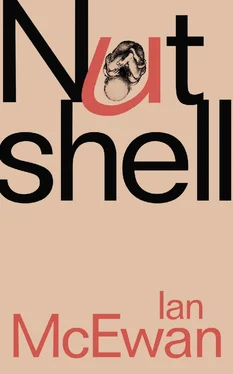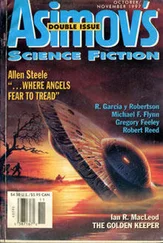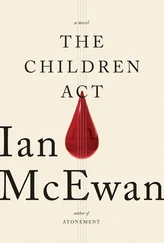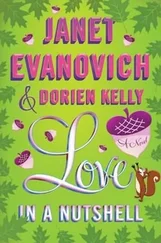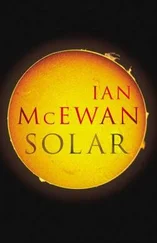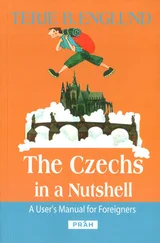Ian McEwan - Nutshell
Здесь есть возможность читать онлайн «Ian McEwan - Nutshell» весь текст электронной книги совершенно бесплатно (целиком полную версию без сокращений). В некоторых случаях можно слушать аудио, скачать через торрент в формате fb2 и присутствует краткое содержание. Год выпуска: 2016, Издательство: Jonathan Cape, Жанр: Современная проза, на английском языке. Описание произведения, (предисловие) а так же отзывы посетителей доступны на портале библиотеки ЛибКат.
- Название:Nutshell
- Автор:
- Издательство:Jonathan Cape
- Жанр:
- Год:2016
- ISBN:нет данных
- Рейтинг книги:3 / 5. Голосов: 1
-
Избранное:Добавить в избранное
- Отзывы:
-
Ваша оценка:
- 60
- 1
- 2
- 3
- 4
- 5
Nutshell: краткое содержание, описание и аннотация
Предлагаем к чтению аннотацию, описание, краткое содержание или предисловие (зависит от того, что написал сам автор книги «Nutshell»). Если вы не нашли необходимую информацию о книге — напишите в комментариях, мы постараемся отыскать её.
Told from a perspective unlike any other,
is a classic tale of murder and deceit from one of the world’s master storytellers.
Nutshell — читать онлайн бесплатно полную книгу (весь текст) целиком
Ниже представлен текст книги, разбитый по страницам. Система сохранения места последней прочитанной страницы, позволяет с удобством читать онлайн бесплатно книгу «Nutshell», без необходимости каждый раз заново искать на чём Вы остановились. Поставьте закладку, и сможете в любой момент перейти на страницу, на которой закончили чтение.
Интервал:
Закладка:
This is my collection of facts and postulates. Hunched over them like a patient philatelist, I’ve added some recent items to my set. He suffers from a skin complaint, psoriasis, which has rendered his hands scaly, hard and red. Trudy hates the look and feel of them and tells him he should wear gloves. He refuses. He has a six-month lease on three mean rooms in Shoreditch, is in debt, is overweight and should exercise more. Just yesterday I acquired — still with the stamps — a Penny Black: the house my mother lives in and I in her, the house where Claude visits nightly, is a Georgian pile on boastful Hamilton Terrace and was my father’s childhood home. In his late twenties, just as he was growing his first beard, and not long after he married my mother, he inherited the family mansion. His dear mother was long dead. All the sources agree, the house is filthy. Only clichés serve it well: peeling, crumbling, dilapidated. Frost has sometimes glazed and stiffened the curtains in winter; in heavy rains the drains, like dependable banks, return their deposit with interest; in summer, like bad banks, they stink. But look, here in my tweezers is the rarest piece of all, the British Guiana: even in such a rotten state, these six thousand aching square feet will buy you seven million pounds.
Most men, most people, would never permit a spouse to eject them from under their childhood eaves. John Cairncross is different. Here are my reasonable inferences. Born under an obliging star, eager to please, too kind, too earnest, he has nothing of the ambitious poet’s quiet greed. He really believes that to write a poem in praise of my mother (her eyes, her hair, her lips) and come by to read it aloud will soften her, make him welcome in his own house. But she knows that her eyes are nothing ‘like the Galway turf’, by which he intended ‘very green’, and since she has no Irish blood, the line is anaemic. Whenever she and I listen, I sense in her slowing heart a retinal crust of boredom that blinds her to the pathos of the scene — a large, large-hearted man pleading his cause without hope, in the unmodish form of a sonnet.
A thousand may be hyperbole. Many of the poems my father knows are long, like those famed creations of bank employees The Cremation of Sam McGee and The Waste Land . Trudy continues to tolerate the occasional recitation. For her, a monologue is better than an exchange, preferable to another turn round the unweeded garden of their marriage. Perhaps she indulges him out of guilt, what little remains. My father speaking poetry to her was once, apparently, a ritual of their love. Strange, that she can’t bear to tell him what he must suspect, what she’s bound to reveal. That she no longer loves him. That she has a lover.
On the radio today, a woman recounted hitting a dog, a golden retriever, with her car on a lonely road at night. She crouched in her headlights by its side, holding the dying creature’s paw through its spasms of frightful pain. Large brown forgiving eyes stared into hers all the while. She took in her free hand a rock and dashed it several times against the poor dog’s skull. To dispatch John Cairncross would take only one blow, one coup de vérité . Instead, as he begins to recite, Trudy will assume her bland, listening look. I, however, attend closely.
We generally go to his poetry library on the first floor. A mantelpiece clock with rackety balance wheel makes the only sound as he takes his usual chair. Here, in the presence of a poet, I permit my conjectures to flourish. If my father looks towards the ceiling to compose his thoughts, he’ll see deterioration in the Adam-style designs. Damage has spread plaster dust like icing sugar across the spines of famous books. My mother wipes her chair with her hand before she sits. Without flourish, my father draws breath and begins. He recites fluently, with feeling. Most of the modern poems leave me cold. Too much about the self, too glassily cool with regard to others, too many gripes in too short a line. But as warm as the embrace of brothers are John Keats and Wilfred Owen. I feel their breath upon my lips. Their kiss. Who would not wish to have written Candied apple, quince, and plum and gourd , or The pallor of girls’ brows shall be their pall ?
I picture her from across the library through his adoring eyes. She sits within a big leather armchair that dates from Freud’s Vienna. Her lithe bare legs are partly, prettily tucked beneath her. One elbow is bent against the arm rest to support her drooping head, the fingers of her free hand drum lightly on her ankle. The late afternoon is hot, the windows are open, the traffic of St John’s Wood pleasantly hums. Her expression is pensive, her lower lip looks heavy. She moistens it with a spotless tongue. A few blonde ringlets lie damply on her neck. Her cotton dress, loosely cut to contain me, is pale green, paler than her eyes. The steady work of pregnancy goes on and she is weary, agreeably so. John Cairncross sees the summer’s flush on her cheeks, the lovely line of neck and shoulder and swollen breasts, the hopeful knoll that is me, the sunless pallor of her calves, the unwrinkled sole of one exposed foot, its line of diminishing, innocent toes like children in a family photo. Everything about her, he thinks, brought to perfection by her condition.
He can’t see that she’s waiting for him to leave. That it’s perverse of her to insist on him living elsewhere, in this, our third trimester. Can he really be so complicit in his annihilation? Such a big fellow, six foot three I’ve heard, a giant with thick black hair on mighty arms, a giant fool to believe it’s wise to grant his wife the ‘space’ she says she needs. Space! She should come in here, where lately I can barely crook a finger. In my mother’s usage, space, her need for it, is a misshapen metaphor, if not a synonym. For being selfish, devious, cruel. But wait, I love her, she’s my divinity and I need her. I take it back! I spoke in anguish. I’m as deluded as my father. And it’s true. Her beauty and remoteness and resolve are one.
Above her, as I see it, the library’s decomposing ceiling releases a sudden cloud of spinning particles that glimmer as they drift across a bar of sunlight. And how she glimmers against the cracked brown leather of the chair where Hitler or Trotsky or Stalin might have sprawled in their Viennese days, when they were but embryos of their future selves. I concede. I’m hers. If she commanded it, I too would go to Shoreditch, and nurse myself in exile. No need for an umbilical cord. My father and I are joined in hopeless love.
Against all the signs — her terse responses, her yawns, her general inattention — he lingers into the early evening, in hopes, perhaps, of dinner. But my mother is waiting for Claude. At last she drives her husband away by declaring her need to rest. She’ll see him to the door. Who could ignore the sorrow in his voice as he makes his tentative goodbyes. It pains me to think he would endure any humiliation in order to spend some minutes longer in her presence. Nothing, save his nature, prevents him doing what others might do — precede her to the master bedroom, to the room where he and I were conceived, sprawl on the bed or in the tub among bold clouds of steam, then invite his friends round, pour wine, be master of his house. Instead, he hopes to succeed by kindness and self-effacing sensitivity to her needs. I hope to be wrong, but I think he’ll doubly fail, for she’ll go on despising him for being weak, and he’ll suffer even more than he should. His visits don’t end, they fade. He leaves behind in the library a field of resonating sadness, an imagined shape, a disappointed hologram still in possession of his chair.
Now we’re approaching the front door as she sees him off the premises. These various depredations have been much discussed. I know that one hinge of this door has parted with the woodwork. Dry rot has turned the architrave to compacted dust. Some floor tiles have gone, others are cracked — Georgian, in a once colourful diamond pattern, impossible to replace. Concealing those absences and cracks, plastic bags of empty bottles and rotting food. Spilling underfoot, these are the very emblems of household squalor: the detritus of ashtrays, paper plates with loathsome wounds of ketchup, teetering teabags like tiny sacks of grain that mice or elves might hoard. The cleaning lady left in sadness long before my time. Trudy knows it’s not a gravid woman’s lot, to heave garbage to the high-lidded wheelie bins. She could easily ask my father to clean the hall, but she doesn’t. Household duties might confer household rights. And she may be at work on a clever story of his desertion. Claude remains in this respect a visitor, an outsider, but I’ve heard him say that to tidy one corner of the house would be to foreground the chaos in the rest. Despite the heatwave I’m well protected against the stench. My mother complains about it most days, but languidly. It’s only one aspect of domestic decay.
Читать дальшеИнтервал:
Закладка:
Похожие книги на «Nutshell»
Представляем Вашему вниманию похожие книги на «Nutshell» списком для выбора. Мы отобрали схожую по названию и смыслу литературу в надежде предоставить читателям больше вариантов отыскать новые, интересные, ещё непрочитанные произведения.
Обсуждение, отзывы о книге «Nutshell» и просто собственные мнения читателей. Оставьте ваши комментарии, напишите, что Вы думаете о произведении, его смысле или главных героях. Укажите что конкретно понравилось, а что нет, и почему Вы так считаете.
